Sneak Preview: FAQ Updates Water Assistance Program Guidance

(The following was excerpted from a recent Federal Grants Compliance Expert article.) Noting that previous guidance contained erroneous information, officials within the Department of Health and Human Services Administration for Children and Families (ACF) recently updated its Frequently Asked Questions (FAQ) document pertaining to the Low-Income Household Water Assistance Program (LIHWAP).
Authorized under the Consolidated Appropriations Act of 2021 (Pub. L. 116-260), LIHWAP helps low-income households affected by the COVID-19 pandemic pay their water and wastewater bills, avoid shutoffs and support household water system reconnections that were halted when water bills were not paid. ACF, through its Office of Community Services (OCS), provides LIHWAP grants to states, territories and tribes to work with private owners and operators of public water systems and treatment facilities to ensure low-income households and families have access to water and wastewater services.
Congress has allocated some $1.1 billion for grants under the program, which includes $638 million from the Consolidated Appropriations Act and $500 million from the American Rescue Plan Act (Pub. L. 117-2). The program is designed to operate similarly to the Low-Income Household Energy Assistance Program (LIHEAP).
OCS has added several new questions and responses related to the program to update its initial LIHWAP FAQ guidance issued in July 2021. One question notes that the previous FAQ indicated that LIHWAP falls within the definition of “federal public benefits” under the Personal Responsibility and Work Opportunity Reconciliation Act of 1996 (PRWORA) (Pub. L. 104-193), which limits eligibility for benefits to citizens or to qualified noncitizens (e.g., lawful permanent residents, refugees and certain individuals with parole status). The previous guidance indicated that these qualified noncitizens may not receive benefits for a period of five years beginning on the date of entry into the U.S. with a qualified status. However, this five-year restriction does not apply to LIHEAP.
The updated guidance notes that the July 21 FAQ discussion of this five-year LIHWAP limitation for qualified noncitizens “was inadvertently added to the guidance and is not correct.” The five-year waiting period is applied under PRWORA to “federal means-tested public benefits,” and the only programs within HHS deemed as such are the Medicaid and Temporary Assistance for Needy Families programs. Therefore, the five-year waiting period does not apply to LIHEAP or LIHWAP.
(The full version of this story has now been made available to all for a limited time here.)
Join us for our following Thompson Grants event:
Thompson Grants Workshop: Federal Grant Reporting - 2022 Update| Feb. 23, 2022 | Virtual Event
Federal Grants Forum For State & Local Governments | March 2-3, 2022 | Virtual Event
Nonprofit Legal, Finance, and Grants Conference | March 16-18, 2022 | Washington, D.C.



